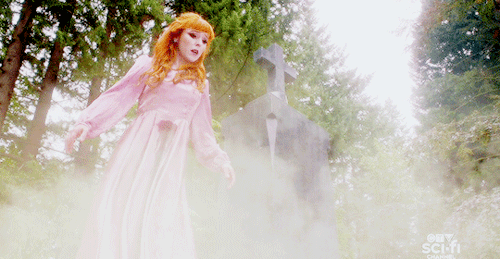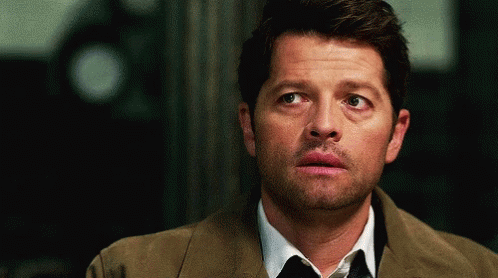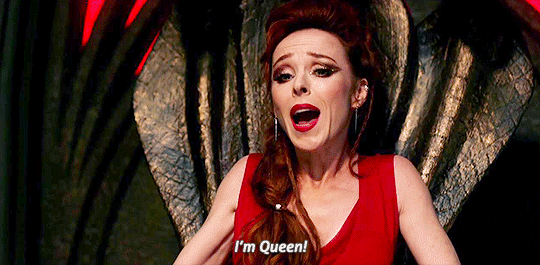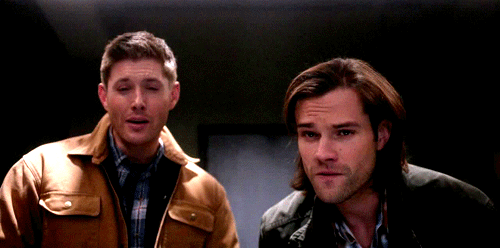Hello and welcome to the first installation of Supernatural: End of the Road. (Do you get it? It’s clever!) Over the next eight weeks, we will be watching, reviewing, and analyzing the final seven episodes of the CW’s Supernatural, a 15-season long show that is finally coming to an end.
But will it be any good? I can’t wait to find out!
These articles will contain spoilers up to the most recent episode. Right now, this article will cover seasons 1-14, and the first 13 episodes of season 15. Be alerted to the spoilers!
I started watching Supernatural just as season 7 premiered, so I had the luxury of binging the Kripke-era seasons 1-5 and then plummeting into despair with 6 and 7. I followed the show through season 10 and recently picked it up again when the most recent seasons were put on Netflix. In total, I’ve seen every season at least once, and some multiple times (including season 15).
Be forewarned: I am a strong proponent of Destiel. More on this later!
Anyone who follows my Game of Thrones writing knows that I normally analyze media through both a Watsonian and Doylist lens: in other words, I consider the story within its own world, and then critique it based on real-life knowledge of the creators. However, for this series, I will be analyzing Supernatural as if it is a text that contains all of the information I need to understand it, like a book. I will not be including creator commentary, actor interviews, or any other spoilers or input from the real-world. This is strictly based on what the “text” provides.
The reason I am limiting myself is twofold: first, there are other resources for Doylist analysis from people who are much more knowledgeable than me. I discovered the podcast “Supernatural: The Road So Far,” which includes a ton of real-world analysis including critique of the writers, actors, and creators behind Supernatural. It isn’t possible for me to know as much as these other writers, and so I leave that task to them.
Second, this is a show with an overactive fan base that often affects the story. While it is interesting to study that interaction, I think the desires of fans can obfuscate the textual evidence we are given within the scripts, in both positive and negative ways. It is worth analyzing this show as a complete piece to pull meaning, themes, and messages from it. And to also try to predict the ending!
With that, let’s recap season 15 so far, and then try to predict the ending of this show for our main characters using textual characterization and major themes.
Season 15 Summary
Season 15 opens with a three-episode arc that solves the problem caused in the cliffhanger of last season: Chuck (aka GOD) opened every door in Hell and released all of the spirits. Team Free Will (read: Sam, Dean, Castiel) work with multiple side characters to lure the ghosts back into Hell and close the fissure. During this time, a demon named Belfagor inhabits the corpse of Jack, who was killed by God in the season 14 finale. It is obvious from their interactions that Cas and Dean’s relationship is seriously strained by Jack’s death, and made especially worse by his corpse’s possession.
Interestingly, to ultimately close the fissure to Hell, the witch Rowena sacrifices her life to cast a spell which requires only two ingredients: her still coursing blood and her final breath. She insists Sam kill her because of **prophecy shit**. This is all a neat enough idea that I can ignore the obvious womb imagery from Rowena absorbing the souls.

The season progresses with a series of monster-of-the-week episodes, which touch mildly on the main plot. We learn that Chuck has continued writing Supernatural, and is specifically writing a dastardly ending to our Sam and Dean. Pieces are placed on and off the chess board as we enter mid-season — Lilith returns, resurrected by Chuck, while the Equalizer firearm is destroyed. The characters also grapple with the possibility that free will does not exist at all, since Chuck has written their stories. This theme continues through multiple episodes.
Sam, using Rowena’s spellbooks, manages to resurrect a formerly dead hunter Eileen. Sam’s prowess with magic reaches its zenith and he steps into the role of being Rowena’s true protégé. In literally the same episode where Sam resurrects someone from the dead, Castiel goes hiking to search for a lost boy — and finds him literally on the hiking trail. This gives him hope again.

Castiel uses his powers to heal the boy, but it is apparent his powers are weakening. Meanwhile, Cas’ “best friend” Dean goes on a totally heterosexual adventure where he encounters an old hunting friend, Lee. Dean and Lee reminisce extensively about their past sexual experiences together, including a night they spent with triplets, which they agreed they split evenly.

Castiel and Sam discover that Sam is a horcrux — I, I mean, that he has a magical connection to God and therefore knows God is weak. Team Free Will use the prophet Donatello to discover that the archangel Michael may know a way to defeat God. When they go to Hell to find Michael in the cage, they learn he was let out, since God’s order to open ALL the doors in Hell was apparently taken quite literally. Also, Rowena has become queen of hell.

God eventually captures Sam and Eileen, and monologues to them about one important thing: without God (light), the Darkness will prevail. Meanwhile, Dean and Cas enter purgatory to find ingredients to the spell to trap God. When Dean loses Cas temporarily, Dean delivers a heartfelt prayer that is legitimately the best acting that has ever happened on this television show. Like, it hit me right in the gay feels.
Sam and Dean attempt to use a spell to trap God, but Sam falters, and the spell fails. Jack is awoken in the Empty by Billie, AKA Death. The season then proceeds to wheelspin for a two-episode arc about the boys losing their “luck” because God decided they are no longer “main characters”. The meta commentary can be overbearing sometimes, guys. The “luck” thing works out because — wouldn’t you know it — Sam and Dean are our main characters. /Facepalm.
Jack is resurrected (woo!) without a soul (boo!) by Billie. God destroys his alternate worlds, and Billie reveals that she has a book which describes God’s death. Billie insists that Jack and the boys are important pieces in the scheme to kill God. Dean notes that, if God is killed, then his sister — the Darkness, Amara — must also be killed. Put a pin in this; it’s important thematically.
In the final episode thus far released, Billie instructs Team Free Will to find a mysterious item to do mysterious magical things. They find it, and it transports Jack to the Garden of Eden. When Jack returns, he has a soul.
Alright, so that’s where we’re at for the first thirteen episodes. What is at the end of this road?
Character endings
Treating the episodes of Supernatural like one continuous text, and working within the limits of that text without meta-input from real people, we can identify multiple series-long themes that should come to a head in the finale. Note that they should — that doesn’t mean it actually will happen. But I’m hopeful this story will be thematically cohesive!
When I say there are “themes,” what I mean is that there is meaning beyond the exact plot and words happening on screen. For example, a major theme that appeared once Chuck was revealed as God has been the paradox of free will along with the struggle to maintain freedom. More broadly, “freedom” is a theme present in every single season of Supernatural. This is perhaps one of the reasons the show struggles so hard with female characters; but that’s a topic for another day.
Using series-long themes, along with the more specific themes of season 15, we can make some interesting predictions about where this show is headed. Consider first the theme of freedom: a hunter’s life is a paradox, because it is both highly “free” — no roots, no social requirements of a family, no need for capitalism, etc. — while also being like a prison — it’s impossible to get out of “the life” without, well, dying. In order to culminate the 15-season-long theme of freedom in any meaningful way, this story must put Sam and Dean in a final position that is neither in nor out of the hunter’s life, to break the paradox and give the audience meaning. Similarly, simply killing both brothers would undermine this theme, and so I believe that is unlikely.

A major, MAJOR theme of season 15 is “returning to roots.” The story, from episode 1 of 15, repeatedly calls back to seasons 1 through 5 (the original Kripke era). We get the recurrence of dozens of characters from the beginning, as well as episodes that mirror monster hunts from that time as well. This set off alarm bells in my head because seasons 1-5, being planned out by Eric Kripke from the jump, were the most thematically cohesive portions of this show to date. And what was the major theme of the Kripke era?
The balance between good and evil!
Kripke’s seasons used multiple devices to express this theme in the story. In small ways, the boys encountered monsters that seemed evil, but sometimes were good, which first introduced the concept that such things must be in balance. The show continued to drive home that things are not actually as simple as good and evil, particularly with the introduction of the angels and the archangels. And, of course, the ultimate expression of this needed equipoise was the fact that Dean was Michael’s perfect vessel, and Sam was Lucifer’s perfect vessel: our two main characters represented the “light” and “dark” archangels. It was a beautifully done theme and gave that additional literary meaning to the story that made it so compelling.
Now, in season 15, Supernatural is poised to carry that theme to a larger scale. Our main characters are trying to literally kill God — and they’ve already acknowledged that they’ll have to kill the Darkness, too, or everything will be unbalanced. I do not see the series ending with Chuck surviving. Therefore, my prediction is: Dean will become the Light, and Sam will become the Darkness. The brothers will assume the roles of the gods they’ve killed, stepping beyond hunters who chase the supernatural, but instead becoming supernatural themselves.
This ending does a few things: first, it allows Sam and Dean to get out of the hunting life without just dying, and to achieve ultimate freedom (while also gaining control over the freedom of others and being able to allow free will to happen across earth); two, it carries through that theme of balance and the need for Light and Dark, and uses the brothers in the same way having them as vessels worked; and three, it turns the 15 seasons of Supernatural into the long and arduous backstories of Earth’s new gods. I think it could be pretty neat!

As for Castiel, I think this one is pretty obvious: he’s going to become human. There is factual evidence in the text, specifically that Cas’ powers have been depleting for a long time already. Also, if Cas is human, then the entity in the Empty cannot collect on their deal: the Empty can only take angels, so once Cas is human, he will be safe on Earth and (assumedly) able to go to heaven upon his death.
Cas becoming human is a meaningful culmination of his character arc. Cas has always been described as a rebellious angel. Humankind is also rebellious towards God, so Cas has that in common with mortals. Cas also likes humans and likes Earth, and does not like heaven. Over the seasons Castiel has learned about human emotions — fear, violence, hatred, and love, compassion, and forgiveness and, most recently, parenthood. Castiel evolving into a mortal human is the proper apotheosis for a supernatural being who invested such time in understanding people, morality, and love.

Jack is a little bit harder to predict because he’s only been around a few seasons, so there isn’t as much textual backing to his character. I think Jack will end up running heaven in some fashion. I don’t think he will die — we’ve killed all of the main four before, there’s no dramatic satisfaction in doing it again — so maybe he’ll be a bridge between Heaven and Earth, or something else like Avatar: the Last Airbender.
It’s also possible there won’t be any angels left by the end of the series. Besides Cas, there’s like three left. Jack may be able to create new angels and rebuild heaven. However it ends, I expect both Heaven and Hell to remain in existence, because there is no significance to destroying those places in this story. That would just be sad for sadness sake. And hey, this isn’t Game of Thrones.
I expect this show to use its themes in the ending because we know the writers can do thematic things. Look at Rowena: a witch who previously worshipped Lucifer becoming the Queen of Hell is thematically cohesive and is a fair apotheosis for her arc. She goes from follower to leader, from servant to served, and the poetic nature of finally finding power in accepting death after using magic to avoid it for so long — mwah! Gorgeous! I mean it’s possible they stumbled into that by accident, but damn I hope not.
Destiel is Real
I do not need to explain to long-time Supernatural viewers why Destiel is important. If we are treating the show as a complete text, it is obvious that Dean Winchester and Castiel have romantic feelings for each other. Many others have commented on this before, and the internet is full of exhaustive lists of evidence for Destiel, so my conclusion is that these romantic feelings are in fact present in the text of this story. Therefore, we must consider the implications of the story ignoring itself.
I firmly believe that this is the right time in human history to acknowledge a leading character has a homosexual/homoromantic relationship, and that Dean Winchester is the perfect character for such representation. As of season 15, he is not stereotypically “gay,” nor is he toxically masculine, nor is he homophobic. He is a man who has grown exponentially since season 1, especially when it comes to understanding his feelings and his love for others, and who has embraced his identity in every other aspect of his life. Character-wise, there is nothing holding Dean Winchester back from admitting his feelings for Castiel. The only road block, really, is that Dean needs to recognize his feelings are romantic, which thus far he has not openly acknowledged. But denial is a realistic and common occurrence for people who are not out.

The important thing about Destiel is that a character like Dean Winchester would be taken seriously as an LGBTQ+ man. His gayness would not simply be the butt of a joke; it wouldn’t be as part of a performance; hell, it wouldn’t even matter much to the plot. This kind of representation is extremely rare for any minority community. Passive representation — when someone is a minority and it is acknowledged by the narrative, though it has no impact on the narrative — is EXTREMELY IMPORTANT representation because, obviously, it is the most realistic.
With that, I say to the CW and the Supernatural staff: DON’T BE COWARDS! Follow the trajectory of the story and the characters. Destiel is textual. If you deny this, it is a homophobic thing. #SorryNotSorry.

With that primer done, I look forward to watching the last seven episodes of this great show. Look for the next installation of “Supernatural: End of the Road” later this week.
Have strong thoughts about this piece you need to share? Or maybe there’s something else on your mind you’re wanting to talk about with fellow Fandomentals? Head on over to our Community server to join in the conversation!
Images Courtesy of the CW

